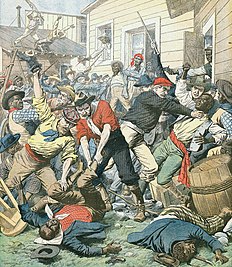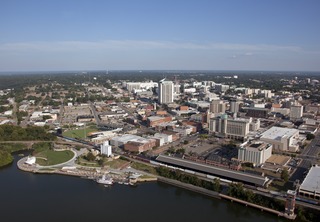
Montgomery is the capital city of the U.S. state of Alabama and the county seat of Montgomery County. Named for Continental Army Major General Richard Montgomery, it stands beside the Alabama River, on the coastal Plain of the Gulf of Mexico. The population was 200,603 at the 2020 census. It is now the third most populous city in the state, after Huntsville and Birmingham, and is the 128th most populous in the United States. The Montgomery Metropolitan Statistical Area's population in 2022 was 385,460; it is the fourth largest in the state and 142nd among United States metropolitan areas.

Barbour County is a county in the southeastern part of the U.S. state of Alabama. As of the 2020 census, the population was 25,223. Its county seat is Clayton. Its largest city is Eufaula. Its name is in honor of James Barbour, who served as Governor of Virginia.

Eufaula is the largest city in Barbour County, Alabama, United States. As of the 2010 census the city's population was 13,137.

Blakely is a city and the county seat of Early County, Georgia, United States. As of 2020, its population was 5,371. It is located approximately halfway between Columbus and Tallahassee, Florida on U.S. Route 27.

Georgetown is a city in Quitman County, Georgia, United States. It is on the Alabama-Georgia state line next to Walter F. George Lake and across the Chattahoochee River from Eufaula, Alabama. Per the 2020 census, the population was 2,235. In 2006, Georgetown and Quitman County voted to consolidate their governments, becoming the smallest such consolidated entity in the Lower 48 states.
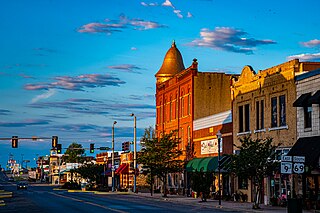
Eufaula is a city and county seat of McIntosh County, Oklahoma, United States. The population was 2,813 at the 2010 census, an increase of 6.6 percent from 2,639 in 2000. Eufaula is in the southern part of the county, 30 miles (48 km) north of McAlester and 32 miles (51 km) south of Muskogee.

The Chattahoochee River forms the southern half of the Alabama and Georgia border, as well as a portion of the Florida and Georgia border. It is a tributary of the Apalachicola River, a relatively short river formed by the confluence of the Chattahoochee and Flint rivers and emptying from Florida into Apalachicola Bay in the Gulf of Mexico. The Chattahoochee River is about 430 miles (690 km) long. The Chattahoochee, Flint, and Apalachicola rivers together make up the Apalachicola–Chattahoochee–Flint River Basin. The Chattahoochee makes up the largest part of the ACF's drainage basin.

U.S. Route 82 is an east–west United States highway in the Southern United States. Created on July 1, 1931 across central Mississippi and southern Arkansas, US 82 eventually became a 1,625-mile-long (2,615 km) route extending from the White Sands of New Mexico to Georgia's Atlantic coast.

William Dorsey Jelks was an American newspaper editor, publisher, and politician who served as the 32nd Governor of Alabama from 1901 to 1907. As Lieutenant Governor of Alabama, he also served as acting governor between December 1 and December 26, 1900, when Governor William J. Samford was out-of-state seeking medical treatment.

The Press-Register was a newspaper serving the southwest Alabama counties of Mobile and Baldwin. The newspaper is a descendant of one founded in 1813, making the Press-Register Alabama's oldest newspaper. It is owned by Advance Publications, which also owns the primary newspapers in Birmingham, Alabama and Huntsville, Alabama. The Press-Register had a daily publication schedule since the inception of its predecessors in the early 1800s until September 30, 2012, when it and its sister papers reduced printing editions to only Wednesday, Fridays and Sundays.
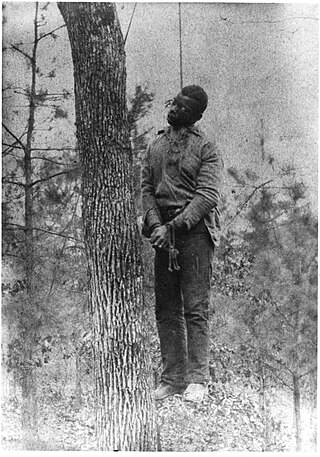
Lynching was the widespread occurrence of extrajudicial killings which began in the United States' pre–Civil War South in the 1830s and ended during the civil rights movement in the 1950s and 1960s. Although the victims of lynchings were members of various ethnicities, after roughly 4 million enslaved African Americans were emancipated, they became the primary targets of white Southerners. Lynchings in the U.S. reached their height from the 1890s to the 1920s, and they primarily victimized ethnic minorities. Most of the lynchings occurred in the American South, as the majority of African Americans lived there, but racially motivated lynchings also occurred in the Midwest and border states. In 1891, the largest single mass lynching in American history was perpetrated in New Orleans against Italian immigrants.

The Georgia Southwestern Railroad is a Class III short line railroad company that operates over 234 miles (377 km) of track in southwestern Georgia and southeastern Alabama. Beginning in 1989 as a division of the South Carolina Central Railroad on a pair of former CSX Transportation lines, the railroad has since undergone a number of transformations through abandonments and acquisitions, before arriving at its current form. The railroad was formerly a RailAmerica property before going independent, and in 2008 it was acquired by Genesee & Wyoming Inc.
The Athens Banner-Herald is a daily newspaper in Athens, Georgia, USA, and owned by Gannett. The paper has a Sunday special and publishes online under the name Online Athens. It has been through a series of restructurings and mergers since 2000, culminating in its sale, along with several other papers, by Morris Communications to Gatehouse Media in August 2017. Since the merger of GateHouse Media and Gannett in November 2019, The Athens Banner-Herald is now owned by Gannett.

U.S. Route 82 in Alabama runs northwest to southeast across the northwestern and central Alabama for 240.080 miles (386.371 km). The route enters from Mississippi east of Columbus, Mississippi and exits into Georgia across the Chattahoochee River at Eufaula.

Philip Joseph was an African American Republican politician and journalist in Reconstruction and Jim Crow-era Alabama.

The Columbus Telegram is a newspaper owned by Lee Enterprises and published in Columbus, in the east-central part of the state of Nebraska in the Midwestern United States. It is delivered on Tuesday through Friday afternoon and on Saturday morning.
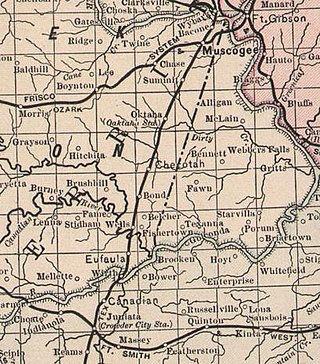
The McIntosh County Seat War was a dispute in Oklahoma over the location of the McIntosh County seat that took place between 1907 and 1909. Following a pair of elections that resulted in the town of Checotah being designated as the new county seat, the people of Eufaula refused to hand over the county records. As a result, a group of heavily armed men from Chectotah attempted to seize the records, but were forced to surrender during the gunbattle that ensued. One year later, after another close election, Eufaula became the permanent county seat.

The National Memorial for Peace and Justice, informally known as the National Lynching Memorial, is a memorial to commemorate the black victims of lynching in the United States. It is intended to focus on and acknowledge past racial terrorism and advocate for social justice in America. Founded by the non-profit Equal Justice Initiative, it opened in downtown Montgomery, Alabama on April 26, 2018.

John D. Roquemore, a Confederate veteran of the American Civil War, was an American lawyer and state senator from Alabama.
